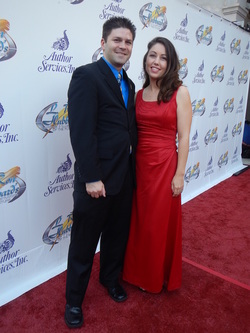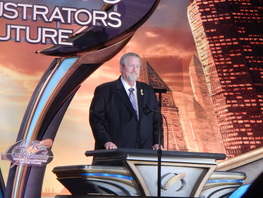|
I'm happy to report my first published story will appear in Issue #14 of Encounters Magazine from Black Matrix Publishing. Woo-Hoo!
I'm a bit nervous about it, but that's expected, right? "Remember the Sunflowers" will appear in Encounters' May issue and I can't wait. You can read a preview of this story under my stories tab, but besides that, I don't want to give anything away. If you want to know more about the story, you'll just have to read it yourself. The funny thing is that I originally wrote this story about 2 and a half years ago as kind of a response to the Occupy Wallstreet movement. It's gone through several rejections and subsequent revisions before it arrived in a state suitable for publication. It would have been easy to give up, but somehow I just knew that if I kept making improvements, it would evetually find a home. Anyways, probably one of the greatest things that comes with finally getting published is the affirmation that you might not be as crazy as you were beginning to suspect. Seriously, most writing takes place in the solitude of your own mind. I do a lot of my writing at Starbucks not because I can't write at home, but because I feel the crowds often act as a counterweight to all the spelunking inside my own skull. Besides that, sometimes it takes weeks, months, or even years before you have a story strong enough to stand on its own beneath the harsh eye of others. Even when people compliment your work, you think that maybe they're just being nice or worse, they truly like it but have poor taste. In any case, publication is sometimes the only form of validation that proves genuine. This little victory has only fueled my writing even more. I'm a few more chapters away--about a month--from finishing my next novel. Then, I'll revise revise revise before I ship it out for the world to see. All I know for sure is this is just the beginning. Thank for Reading, K.C. Aegis Stephen Hawking once said, "If time travel exists, where are all the tourists from the future?" It is a simple question and one might think that any lack of future tourists automatically disqualifies the existence of such temporal transportation.
However, who is to say time travelers would want to come to our time anyways? Would it make sense for highly evolved beings to travel to a time as polluted and dangerous as ours when there are endless amounts of time more suitable for leisurely travel. I mean, if I wanted to swim in the untainted waters near Cyprus, the same place where Aphrodite rose out of the sea, would I want to do it in a time when that land was surrounded by commercial development and societal upheaval, or would I travel to a time in the more distant past? Or, to take the idea further, if I wanted to retire, would I want to do it in modern or ancient times? In the present, a time traveler could only impress the authorities so much before he/she was put on lock down and milked for all their technological know-how. On the other hand, ancient societies might see their technological advances and revere them as gods. this aside, there is the question of a universe-destroying paradox to think about. Theoretically, a paradox occurs when changes to the past make those changes impossible to begin with. Such as, going back in time and killing your grandfather before he met your grandmother. Or, in the case of Back to the Future, having your mom get the hots for you instead of your dad. In any case, the new future would spawn a world where the time traveler wouldn't exist, thus negating their effects on the past. Confusing? Yes, but it makes for interesting fiction at times. Who knows, someday we might discover that our first civilizations ranging from Minoan to Egyptian were merely the retirement homes for more advanced time travelers. Far fetched? Perhaps, but I wonder if it is any more likely that nomadic apes evolved into empires led only by survival instincts. As for me, I'm no Billy Pilgrim and I have no choice but to ride the one-way time train into the future. By the time you read this, I'll already be there. ---K.C. Aegis Someone once asked me, "Why science fiction?" They proceeded to outline many of the tired tropes that have come to be associated with the genre. It's all just made up nonsense focusing on boring post apocalyptic landscapes or green-skinned space babes.
"No matter how much crackpot writers want to fool themselves," this person went on to say, "it isn't grounded in reality. It's myth." I wondered if this person had a point. So I ran back through the many volumes I'd grown up reading as a child, and later as an adult. Stories by Mary Shelly, Isaac Asimov, Ray Bradbury, George Orwell, Stephen King (yes, I consider him a science fiction writer), and many others. Were all these tales just a colossal waste of time? The obvious answer is "no." Otherwise, I wouldn't be here, attempting to follow in the footsteps of giants. However, "no" wasn't good enough. I needed to know what was it about Science Fiction that pulled at my strings time and time again. I came to the realization that what science fiction does that other genres cannot, is set up a frame in which the author can examine specific character traits in the human condition. Much of what I learned about my life came from books. They force us to slow down, cut out the distractions, and examine, really pay attention to the small details encompassing our nature. Fahrenheit 451 taught me about the importance of books and freedom of ideas. I, Robot helped me better understand humans by talking about machines. The Dark Tower helped me see the importance of perseverance and wonder. Unlike nonfiction, science fiction allows the author to manipulate the world in a way so readers can get a glimpse of very intimate truths about humanity. In addition to the self reflective nature of good science fiction, there is another, perhaps more important quality of science fiction. Regardless of how unrealistic science fiction might appear to be from time to time (I'm looking at you, Interstellar), it allows readers to look up from their tired lives. To see beyond themselves--beyond their skies out past the possible and wonder, "What if?" I will end this article with a quote by Louis L'More. He writes, "If we are content to live in the past, we have no future. And today is the past." ---K.C. Aegis |
|



 RSS Feed
RSS Feed